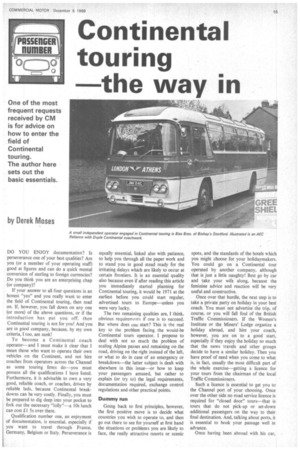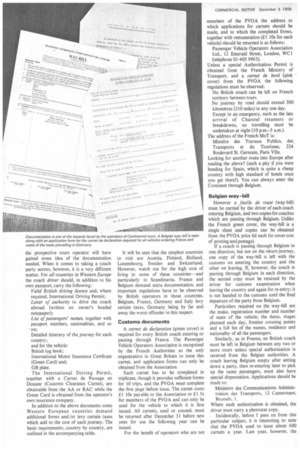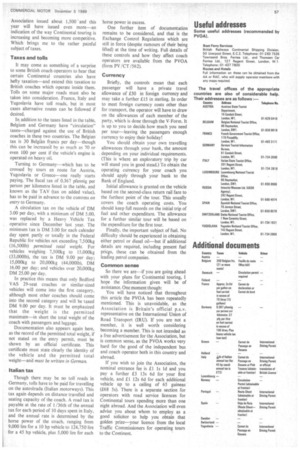Continental touring the way in
Page 57

Page 58

Page 59

If you've noticed an error in this article please click here to report it so we can fix it.
DO YOU ENJOY documentation? Is perseverance one of your best qualities? Are you (or a member of your operating staff) good at figures and can do a quick mental conversion of sterling to foreign currencies? Do you think you are an enterprising chap (or company)?
If your answer to all four questions is an honest "yes" and you really want to enter the field of Continental touring, then read on. If. however, you fall down on any one (or more) of the above questions, or if the introduction has put you off. then Continental touring is not for you! And you are in good company, because, by my own criteria, too, am sunk!
To become a Continental coach operator—and I must make it clear that I mean those who want to operate their own vehicles on the Continent, and not hire coaches from operators across the Channel as some touring firms do—you must possess all the qualifications I have listed. Furthermore, it is advisable to own a very good. reliable coach, or coaches, driven by reliable lads, because Continental breakdowns can be very costly. Finally, you must be prepared to dig deep into your pocket to fork out the necessary "lolly"—a lOs lunch can cost Ll Ss over there.
Qualification number one, an enjoyment of documentation, is essential, especially if you want to travel through France, Germany, Belgium or Italy. Perseverance is equally essential, linked also with patience, to help you through all the paper work and to stand you in good stead ready for the irritating delays which are likely to occur at certain frontiers. It is an essential quality also because even if after reading this article you immediately started planning for Continental touring, it would be 1971 at the earliest before you could start regular, advertised tours to Europe—unless you were very lucky.
The two remaining qualities are, I think, obvious requirements if one is to succeed. But where does one start? This is the real key to the problem facing the would-be Continental tours operator. I propose to deal with not so much the problem of scaling Alpine passes and remaining on the road, driving on the right instead of the left, or what to do in case of an emergency or breakdown—the latter subject is dealt with elsewhere in this issue—or how to keep your passengers amused. but rather to explain (or try to) the legal requirements, documentation required, exchange control regulations and other practical points.
Dummy run Going back to first principles, however, the first positive move is to decide what countries you wish to operate to, and then go out there to see for yourself at first hand the situations or problems you are likely to face, the really attractive resorts or scenic spots, and the standards of the hotels which you might choose for your holidaymakers. You could go on a Continental tour operated by another company. although that is just a little naughty! Best go by car and take your wife along, because the feminine advice and reaction will be very useful and constructive.
Once over that hurdle, the next step is to take a private party on holiday in your best coach. You must not advertise the trip, of course, or you will fall foul of the British Traffic Commissioners. If the Women's Institute or the Miners' Lodge organize a holiday abroad, and hire your coach, however, you are on to a good start, especially if they enjoy the holiday so much that the news travels and other groups decide to have a similar holiday. Then you have proof of need when you come to what is, in fact, usually the most difficult part of the whole exercise—getting a licence for your tours from the chairman of the local Traffic Commissioners.
Such a licence is essential to get you to the Channel port of your choosing. Once over the other side no road service licence is required for "closed door" tours—that is tours that do not pick-up or set-down additional passengers on the way to their final destination. And, talking about ports, it is essential to book your passage well in advance.
Once having been abroad with his car,
the prospective tours operator will have gained some idea of the documentation needed. When it comes to taking a coach party across, however, it is a very different matter. For all countries in Western Europe the coach driver should, in addition to his own passport, carry the following: Valid British driving licence and, where required, International Driving Permit; Letter of authority to drive the coach abroad (written on owner's headed notepaper); List of passengers' names, together with passport numbers, nationalities, and so on;
Detailed itinerary of the journey for each country;
and for the vehicle:
British log book; International Motor Insurance Certficate (Green Card) and; GB plate.
The International Driving Permit, together with a Carnet de Passage en Douane (Customs Clearance Carnet), are obtainable from the AA or RAC while the Green Card is obtained from the operator's own insurance company.
In addition to the above documents some Western European countries demand additional forms and/or levy certain taxes which add to the cost of each journey. The basic requirements, country by country, are outlined in the accompanying table.
It will be seen that the simplest countries to visit are Austria, Finland, Holland, Luxembourg, Sweden and Switzerland. However, watch out for the high cost of living in some of these countries—and particularly in Scandinavia. France and Belgium demand extra documentation, and important regulations have to be observed by British operators in those countries. Belgium, France, Germany and Italy levy certain taxes, Germany being by far and away the worst offender in this respect.
Customs documents
A carnet de declaration (green cover) is required for every British coach entering or passing through France. The Passenger Vehicle Operators Association is recognized by the French Authorities as the only organization in Great Britain to issue this carnet, and application forms can only be obtained from the Association.
Each carnet has to be completed in triplicate, though it provides sufficient forms for 10 trips, and the PVOA must complete the first page before issue. The carnet costs ft 10s payable to the Association or £1 5s for members of the PVOA and can only be used for the vehicle to which it is first issued. All carnets, used or unused, must be returned after December 31 before new ones for use the following year can be issued.
For the benefit of operators who are not members of the PVOA the address to which applications for carnets should be made, and to which the completed forms, together with remuneration (£1 lOs for each vehicle) should be returned is as follows: Passenger Vehicle Operators Association Ltd., 12 Emerald Street, London, WC1 (telephone 01-405 9963).
Unless a special Authorization Permit is obtained from the French Ministry of Transport, and a carnet de bord (pink cover) from the PVOA the following regulations must be observed:
No British coach can be left on French territory between tours.
No journey by road should exceed 500 kilometres (310 miles) in any one day. Except in an emergency, such as the late arrival of Channel steamers or breakdowns, no travelling must be undertaken at night (10 p.m.-5 a.m.).
The address of the French MoT is: Minisire des Travaux Publics, des, Transports et du Tourisme, 224 Boulevard St. Germain, Paris Vile.
Looking for another route into Europe after reading the above? (such a pity if you were heading for Spain, which is quite a cheap country with high standard of hotels once you get there!). You can always enter the Continent through Belgium.
Belgian way-bill
However a feuille de route (way-bill) must be carried by the driver of each coach entering Belgium, and two copies for coaches which are passing through Belgium. Unlike the French green cover, the way-bill is a single sheet and copies can be obtained from the PVOA price 6d each (to cover cost of printing and postage).
If a coach is passing through Belgium in one direction, but not on the return journey, one copy of the way-bill is left with the customs on entering the country and the other on leaving. If, however, the coach is passing through Belgium in each direction, the second copy must be retained by the driver for customs examination when leaving the country and again for re-entry; it is not handed to the customs until the final departure of the party from Belgium.
Particulars required on the way-bill are the make, registration number and number of seats of the vehicle, the dates, stages planned each day, frontier crossing points and a full list of the names, residence and nationality of all the passengers.
Similarly, as in France, no British coach must be left in Belgium between any two or more tours unless special authorization is received from the Belgian authorities. A coach leaving Belgium empty after setting down a party, then re-entering later to pick up the same passengers, must also have special dispensation. Applications should be made to: Ministere des Communications Administration des Transports, 12 Cantersteen, Brussels. 1.
Where such authorization is obtained, the driver must carry a photostat copy.
Incidentally, before I pass on from this particular subject, it is interesting to note that the PVOA used to issue about 600 carnets a year. Last year, however, the Association issued about 1,500 ' and this year will have issued even more—an indication of the way Continental touring is increasing and becoming more competitive. Which brings me to the rather painful subject of taxes.
Taxes and tolls It may come as something of a surprise to some British coach operators to hear that certain Continental countries also have hefty taxation—and extend this taxation to British coaches which operate inside them. Tolls on some major roads must also be taken into consideration. .France, Italy and Yugoslavia have toll roads, but in most cases alternative routes can be followed if desired.
In addition to the taxes listed in the table, Belgium and Germany have "circulation" taxes—charged against the use of British coaches in these two countries. The Belgian tax is 30 Belgi\an francs per day—though this can be increased by as much as 70 or even 100 per cent if the vehicle's engine is operated on heavy oil.
Turning to Germany—which has to be crossed by tours en route for Austria, Yugoslavia or Greece—one really starts paying. The fiscal tax of 0.367 pfennig per person per kilometre listed in the table, and known as the TAV (tax on added value), has to be paid in advance to the customs on entry to Germany.
A circulation tax on the vehicle of DM 3.00 per day, with a minimum of DM 5.00, was replaced by a Heavy Vehicle Tax operative since December last year. The minimum tax is DM 3.00 for each calender day spent partly or totally in the Federal Republic for vehicles not exceeding 7,500kg (16,5001b) permitted total weight. For vehicles weighing 7,500kg to 15,000kg (33,0001b), the tax is DM 9.00 per day; 15,000kg to 20.000kg (44,0001b), DM 16.00 per day; and vehicles over 20,000kg DM 25.00 per day.
In practice this means that only Bedford VAS 29-seat coaches or similar-sized vehicles will come into the first category, although most other coaches should come into the second category and will be taxed DM 9.00 per day. It must be emphasized that the weight is the permitted maximum—in short the total weight of the coach with passengers and luggage.
Documentation also appears again here, as the record of the permitted total weight, if not stated on the entry permit, must be shown by an official certificate. This certificate must state clearly the identity of the vehicle and the permitted total weight—and must be written in German.
Italian tax Though there may be no toll roads in Germany, tolls have to be paid for travelling on the autostrada (Italian motorways). This tax again depends on distance travelled and seating capacity of the coach. A road tax is payable at the rate of 1 /36th of the annual tax for each period of 10 days spent in Italy, and the annual rate is determined by the horse power of the coach, ranging from 9,000 lire for a 10 hp vehicle to 124,750 lire for a 45 hp vehicle, plus 5,000 lire for each horse power in excess.
One further item of documentation remains to be considered, and that is the Exchange Control Regulations which are still in force (despite rumours of their being lifted) at the time of writing. Full details of these controls and how they affect coach operators are available from the PVOA (form PV /CT /562).
Currency
Briefly, the controls mean that each passenger will have a private travel allowance of £50 in foreign currency and may take a further £15 in sterling. In order to meet foreign currency costs other than for transport, the operator will have to draw on the allowances of each member of the party, which is done through the V-Form. It is up to you to decide-how much you need per tour—leaving the passengers enough currency to enjoy their holiday!
You should obtain your own travelling allowances through your bank, the amount depending on your individual requirements. (This is where an exploratory trip by car will stand you in good stead.) To obtain the operating currency for your coach you should apply through your bank to the Bank of England.
Initial allowance is granted on the vehicle based on the second-class return rail fare to the furthest point of the tour. This usually covers the coach operating costs. You should keep full records on the initial trip of fuel and other expenditure. The allowance for a further similar tour will be based on the expenditure for the first tour.
Finally, the important subject of fuel. No difficulty should be experienced in obtaining either petrol or diesel oil—but if additional details are required, including present fuel price, these can be obtained from the leading petrol companies.
Common sense So there we are—if you are going ahead with your plans for Continental touring, I hope the information given will be of assistance. One moment though: You will have noticed that throughout this article the PVOA has been repeatedly mentioned. This is unavoidable, as the Association is Britain's official p.s.v. representative on the International Union of Road Transport (IRU). If you are not a member, it is well worth considering becoming a member. This is not intended as a free advertisement for the Association, but is common sense, as the PVOA works very hard for the good of the independent bus and coach operator both in this country and abroad.
If you wish to join the Association, the nominal entrance fee is £1 Is Id and you pay a further £3 13s 6d for your first vehicle, and £1 12s 6d for each additional vehicle up to a ceiling of 65 guineas (£68 5s). There is a separate section for operators with road service licences for Continental tours spending more than one night abroad. And the Association will even advise you about whom to employ as a good solicitor to help you obtain that golden prize—your licence from the local Traffic Commissioners for operating tours to the Continent.






















































































































































